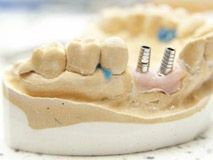How one dentist explains the benefits of dental implants to his patients

More and more people are interested in dental implants. How does one dentist explain the procedure to his patients? Dr. Chad Drennan of Aledo, Texas, let Dental Practice Management in on his techniques.
When it comes to tooth replacement therapy, there are several options from which to choose. These options include complete or partial removable dentures, fixed partial dentures (bridges), and dental implants. I’ve found in my own practice that most of my patients are familiar with the terms “dentures” and “bridges,” along with their designs and mechanisms of functionality. Unfortunately, there are far fewer new patients who come into my office who have a thorough knowledge of dental implant therapy, and its advantages over other methods of tooth replacement.
The advantages and disadvantages of complete dentures, removable partial dentures, and fixed partial dentures are well-documented. The most widely accepted advantage of complete or partial dentures is cost-effectiveness. While the disadvantages include (but are not limited to):
1) poor retention and stability
2) esthetic limitations
3) speech difficulty
4) poor facial and lip support
5) premature aging
6) accelerated bone loss
7) avoidable damage to otherwise healthy adjacent teeth
8) difficulty with cleaning and home care
9) substantially limited chewing efficiency compared to natural teeth.
Only one tooth replacement therapy available can essentially nullify all of the aforementioned disadvantages, resulting in predictable and beautiful tooth restorations.
The following discussion will explain why dental implants are most likely the best tooth replacement option available to your patients.
Q: What is a dental implant?
A: A dental implant is an endosseous fixture or screw made out of commercially pure titanium. This fixture is surgically placed into an edentulous site of jawbone to mimic the root of the missing tooth. This “root” will be used to attach and anchor a dental prosthesis, such as a crown, bridge, or removable prosthesis.
Q: How do dental implants work?
A: Dental implants are made with biocompatible materials that are not only safe and well accepted by the body, but also stimulate bone growth that forms a natural mechanical bond with the implant. Once this “bond” is complete, your dentist can attach the final tooth or teeth to the implant/implants.
Q: What are the advantages of dental implants?
A: Once a mechanical bond is formed between bone and implant, it will help minimize future oral bone loss. Furthermore, it maintains the integrity of adjacent healthy teeth by reducing periodontal stresses and avoiding aggressive tooth preparation required with bridges and partials. Finally, implants restore teeth in a manner that most closely resembles nature, both functionally and esthetically.
Q: Will it hurt to have dental implant surgery?
A: It is natural to experience some level of anxiety about surgical procedures. Dental implant surgery is typically a quick, outpatient procedure that can be performed under local anesthesia. For patients with severe anxiety, the procedure can be performed under any number of available conscious sedation techniques. As with any procedure some soreness, swelling, and even bruising can occur. If needed, prescription pain medications will be provided, but post-op pain management can usually be achieved with over-the-counter medications such as Ibuprofen or Acetaminophen.
Q: Are dental implants expensive?
A: Fees will vary from one place to the next, but the initial fee for a single tooth implant is typically more than a three-unit fixed bridge or removable prosthesis. However, most fixed bridges and/or removable prostheses will require replacement three or more times throughout a lifetime due to recurrent decay, periodontal disease, and tooth fracture. Due to much more predictable long-term success rates, studies have shown that the cost differential between dental implants and their counterparts will be equalized in about seven years. Furthermore, by choosing dental implants, the amount of money saved over the course of a lifetime is substantial.